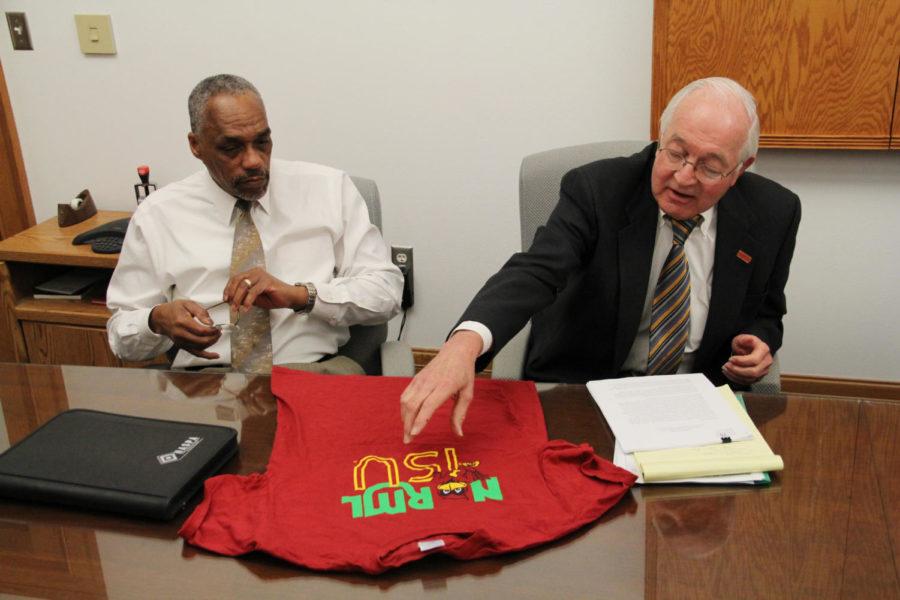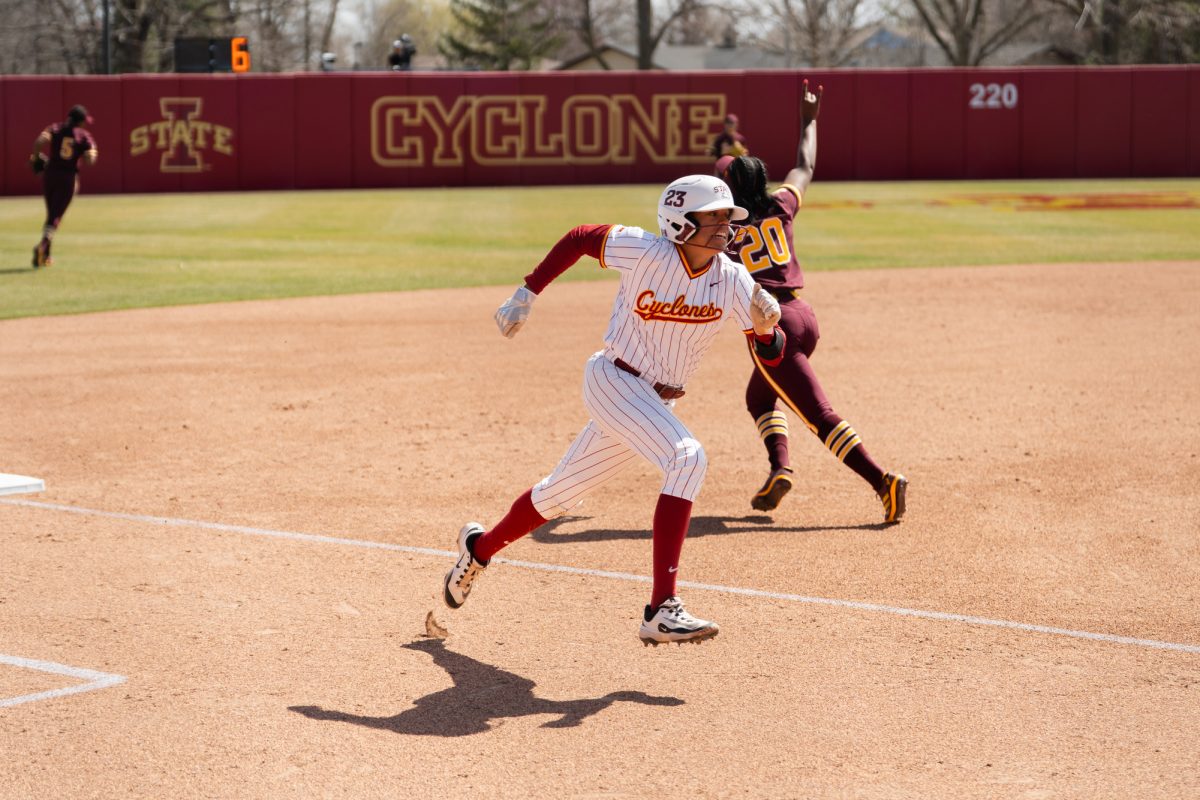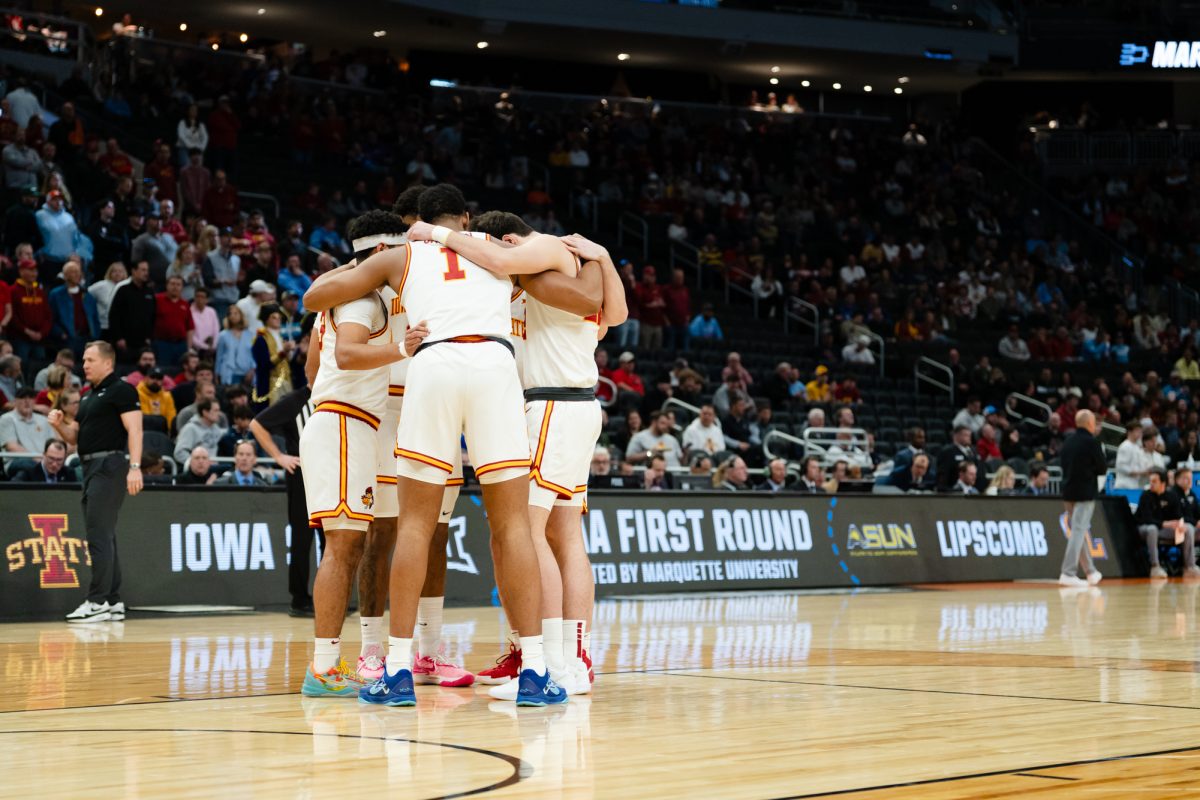NORML ISU wins lawsuit after four-year battle
Photo: William Deaton/Iowa State
Tom Hill, senior vice president of Student Affairs, and Warren Madden, senior vice president for Business and Finance, look at the NORML ISU T-shirt during a meeting with the club. The shirt is the subject of controversy due to the logo of ISU mascot Cy being used, since the use of marijuana is illegal.
February 4, 2016
Marijuana and Cy can go hand-in-hand, at least on a T-shirt.
A four-year battle between the student group, NORML, the National Organization for the Reform of Marijuana Laws, and administration came to a head Jan. 22, in favor of the student organization.
In a 45-page ruling released by the Foundation for Individual Rights in Education, FIRE, the U.S District Court for the Southern District of Iowa fell in favor of plaintiffs Paul Gerlich and Erin Furleigh, in which the university is now permanently restricted from enforcing the trademark policies against NORML in a discriminatory manner.
“Defendants are hereby permanently enjoined from enforcing trademark licensing policies against Plaintiffs in a viewpoint discriminatory manner and from further prohibiting Plaintiffs from producing licensed apparel on the basis that their designs included the image of a similar cannabis leaf,” the court documents stated.
Gerlich and Furleigh, who both served as president and vice president of the chapter and are current ISU students, filed the suit in July 2014, on the basis that Iowa State infringed on their First and 14th Amendment rights.
The grievances, which began Nov. 19, 2012, after a front-page article by the Des Moines Register, which focused on marijuana’s recent political activities, was published with a quote by then-president and founder Josh Montgomery.
Montgomery, expressing that he felt the university was supportive of NORML ISU, was also featured in a picture of him wearing and holding their chapter T-shirt, which read, “Freedom is NORML at ISU” with a cannabis leaf on the back. The T-shirt design had been previously approved for production and sale by the trademarking office in October.
It was then when the defendants, President Steven Leath, Senior Vice President for Business and Finance Warren Madden, Director of Trademark Licensing Leesha Zimmerman and then-Senior Vice President for Student Affairs Tom Hill, would receive backlash from public and political groups about the shirt and Iowa State’s involvement.
All of the defendants declined to comment on the recent court order, said John McCarroll, executive director of university relations.
A President’s cabinet meeting took place Nov. 26, 2012, to discuss the T-shirt design and the possibility of revising a few of the trademark policies.
The discussion only lasted 10 to 15 minutes, and Leath remembers no actual deliberation on the topic, according to the court documents.
“If there was a discussion it was extremely brief,” Leath said. “It was more like, ‘Yeah, everybody gets it. Go fix it.’”
“The meeting came to the conclusion that the students need to come up with new designs. The T-shirt they have now has been declared as unfit, and seen as Iowa State endorsing something [it is] not. The shirts are no longer in production,” according to an article published by the Daily on Nov. 28, 2012.
“We have a university concern with the potential of producing more shirts with the mark on it, as is,” Madden was quoted saying at the meeting. “You have to put these in context: there is no question you got approval to do this, and now we are getting feedback and reviewing the T-shirt.”
Madden then instructed Zimmerman to consult him before approving any reorders that NORML ISU might attempt.
Madden began investigating whether NORML ISU met the qualifications for recognition as a student organization 10 days after The Des Moines Register published its article. It was discovered that the group’s adviser, an ISU custodian, violated the recognition standards.
The administration then told NORML at its next meeting that the group would have to replace its adviser or it would lose its status as a recognized group, according to the court documents. And that because the T-shirt caused confusion about whether Iowa State supported the legalization of marijuana, it did not conform to university policies and needed to be changed.
Hill said he would be willing to step in as interim faculty adviser so the chapter could remain a student organization, but the group found Eric Cooper, associate professor of psychology, instead.
“It kind of looked like Cy was endorsing our cause, and that’s where it kind of all started,” Gerlich said in an interview with the Daily in 2014. “From there, we were told that we could no longer produce the T-shirts.”
“They can do and say whatever they want to do and say,” Hill said in an interview with the Daily in 2014. “But they don’t have the right to use the university logo or the university name to support their position.”
The ISU Trademark Guidelines were revised the year after the initial reaction to the shirt to include a new section, one that clarified that ISU marks could not be used to suggest promotion of certain items, including illegal drugs, and that Iowa State’s name and marks could not be used to imply support or endorsement in matters of public concern, according to the court documents.
A tier group was also created with the revisions, which restricted the use of ISU trademarks for certain classes of ISU groups. The tiering system divided student groups into either “sponsored,” “recognized” or “registered” organizations.
Sponsored organizations received full permission to use ISU logos, including Cy the Cardinal. Recognized groups such as NORML ISU received limited use. Groups in the registered tier would not be permitted the use of ISU logos at all.
To then test what the group could do, NORML ISU submitted two t-shirt designs that read “NORML ISU” across the front and “We are NORML” across the back, and another shirt saying “NORML ISU Student Chapter.” The t-shirts went on to be approved by the trademark office.
Three different T-shirt designs were then submitted that included cannabis leaf graphics and political slogans. Hill, who was then the interim adviser, informed Montgomery that the three designs were not acceptable. The group’s Facebook page would also need some changes, which included the removal of a graphic with a cannabis leaf.
More T-shirt designs would then be submitted, which included an image of a tetrahydrocannabinol molecule, all the way to a slogan reading “It’s not for everyone but it’s not a crime.”
Those, among others, were all rejected, grossly on the basis that “the depiction of the cannabis leaf violated the trademark guideline prohibiting licenses for designs that “suggest promotion” of “dangerous, illegal or unhealthy products, actions or behaviors; drugs and drug paraphernalia that are illegal or unhealthful.”
Then, a year and half following initial complaints against NORML ISU, Gerlich and Furleigh filed suit, claiming that the new guidelines were “overly broad and vague” and the the vague wording of the policy allows for administrators to make judgements based on “arbitrary application” or on the basis of “the viewpoint to be expressed,” according to a July 2014 Daily article.
Will Creeley, who works for FIRE, said in an interview with the Daily in 2014, “ISU cannot censor certain viewpoints simply because they are controversial, dissent from the current order or express ideas that ISU administrators would rather not hear.
On Sept. 9, 2014, the university pushed a 13-page motion to dismiss the four administrators and that the suit should be dropped for a number of reasons, one being that “both Furleigh and Gerlich failed to provide facts that showed their First Amendment right to speech was violated.”
Four months later, a federal judge denied Iowa State’s request to dismiss the freedom of speech case. Iowa State had tried arguing that the case is more about trademark issues than what was at hand.
A jury trial was then scheduled for Dec. 14, 2015. However, in October the judge canceled the trial date and both parties moved to file motions for pre-judgements, meaning the courts should rule without a trial.
NORML ISU would go on to win their case on Friday, Jan. 22.
Gerlich and Montgomery, while happy, however, are not completely satisfied with the win.
“So, essentially, we won and we lost,” Gerlich said. “We didn’t win as much as I believe we should have, but we did win.”
“How we didn’t win was that we basically tried to say that their policy was too broad,” Gerlich continued. Gerlich said that the university attempted to clump them with supporting marijuana instead of just marijuana reform laws.
“We said that their rules are too general and they were subjectively and arbitrarily enforced, which was not agreed upon by the judge. So they get to keep the rules, but they’re not applied to us in that specific instance.”
Montgomery additionally said, “It’s a victory for free speech, whether or not you believe marijuana should be criminalized or not.”
“It’s not over yet, because the university may appeal and they’ll lose again.”
In an e-mail to the Daily on Jan. 22, McCarroll wrote, “Today’s U.S. District Court opinion in the NORML case is disappointing. Iowa State will consult with the Iowa Attorney General’s Office to determine if the order will be appealed.”
Win or lose, Montgomery still felt their group was personally targeted by the administrators due to outside entities.
Montgomery, in his interview with the Daily, discussed his reactions to how the administration dealt with the t-shirts and realized that the issue was much bigger than himself and their organization.
“When the university handed down the original decision to revoke our right to create design… we were taken aback. It became real to us that we were smaller than the institution, that students didn’t play as much of a role in the university,” Montgomery said.
Montgomery even claimed that, “Instead of standing up for what students believed in, they [administration] heeded the political pressure they received from Steve Lukan,” who is the director of the governor’s office for drug control policy.
In the FIRE report, it was stated that two days after the Des Moines Register article came out, that Lukan called Leath’s office asking how they would respond and change the trademark approval policies.
Brad Trow, Iowa House Republican caucus staff, also called Leath’s office asking about the approval of the NORML ISU t-shirt design.
Montgomery’s claims were confirmed when according to the report, Madden acknowledged that the January 16, 2013, revisions to the ISU Trademark Guidelines were made as a result of external criticism, including observers’ perceptions that ISU supported NORML ISU’s advocacy for marijuana law reform.
Leath was also quoted at the time, “my experience would say in a state as conservative as Iowa on many issues, that it was going to be a problem,” and, “it would be unwise, it would just be foolish not to have a close working relationship with the top government official when you’re a government entity.”
“If there is a villain in this situation, it’s whoever put the pressure on administrators to stifle the students,” Montgomery said.
As for now, Montgomery had a few words on the future of the case and of NORML ISU’s t-shirts.
“It doesn’t just mean NORML can put a cannabis leaf on the shirts—and boy, are we going to put lots of leaves on our shirts.”







